 Melissa Anderson
Melissa Anderson
In Andrew Haigh’s latest film, close encounters of the
metaphysical—and X-rated—kind.
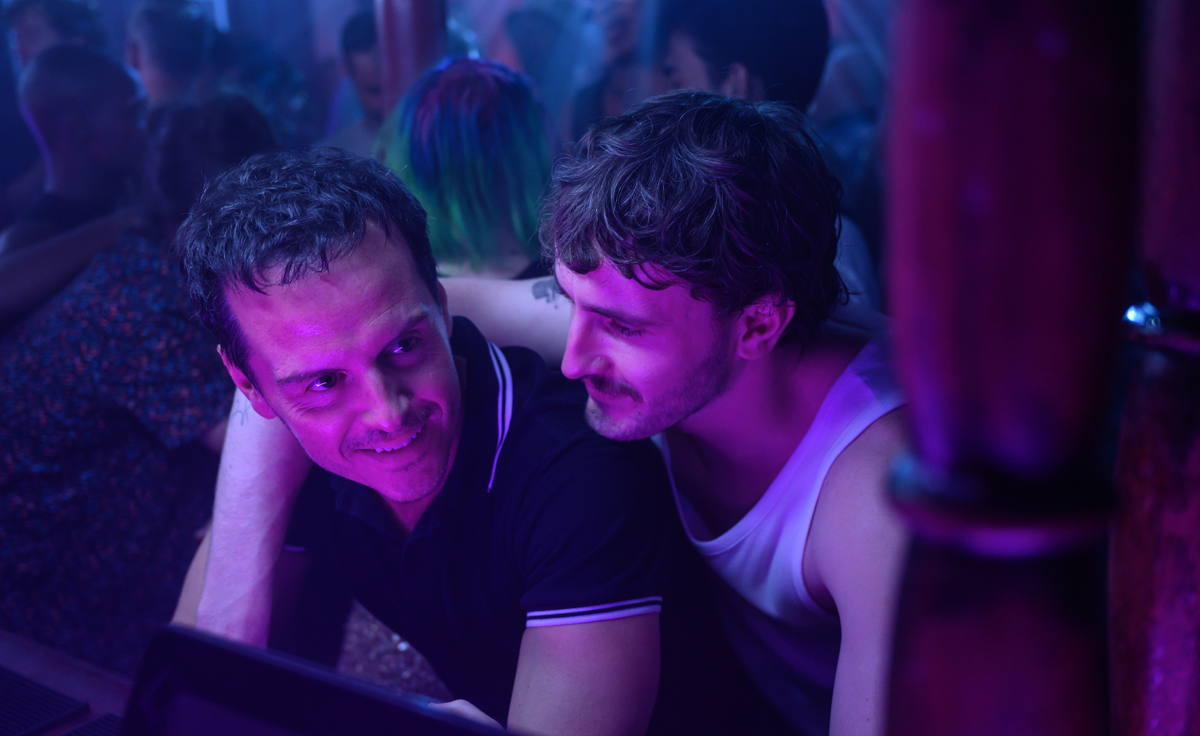
Andrew Scott as Adam and Paul Mescal as Harry in All of Us Strangers. Courtesy Searchlight Pictures. Photo: Parisa Taghizadeh. © Searchlight Pictures.
All of Us Strangers, written and directed by Andrew Haigh, opening in theaters December 22, 2023
• • •
The best-known work of the British writer-director Andrew Haigh focuses on desire, often in its initial stages, and usually between gay men. Weekend, his 2011 breakthrough, centers on lifeguard Russell and art student Glen, whose one-night stand unexpectedly morphs into forty-eight hours of intensifying sexual and emotional intimacy. Looking, the short-lived HBO series from the mid-2010s for which Haigh wrote and directed several episodes, intelligently explored the dating and romantic lives of a constellation of gay guys in their twenties and thirties in San Francisco. In 45 Years (2015), a straight married couple, still loving and affectionate with each other after nearly a half-century together, find their bonds tested when the wife learns more about a relationship her husband had before they wed.
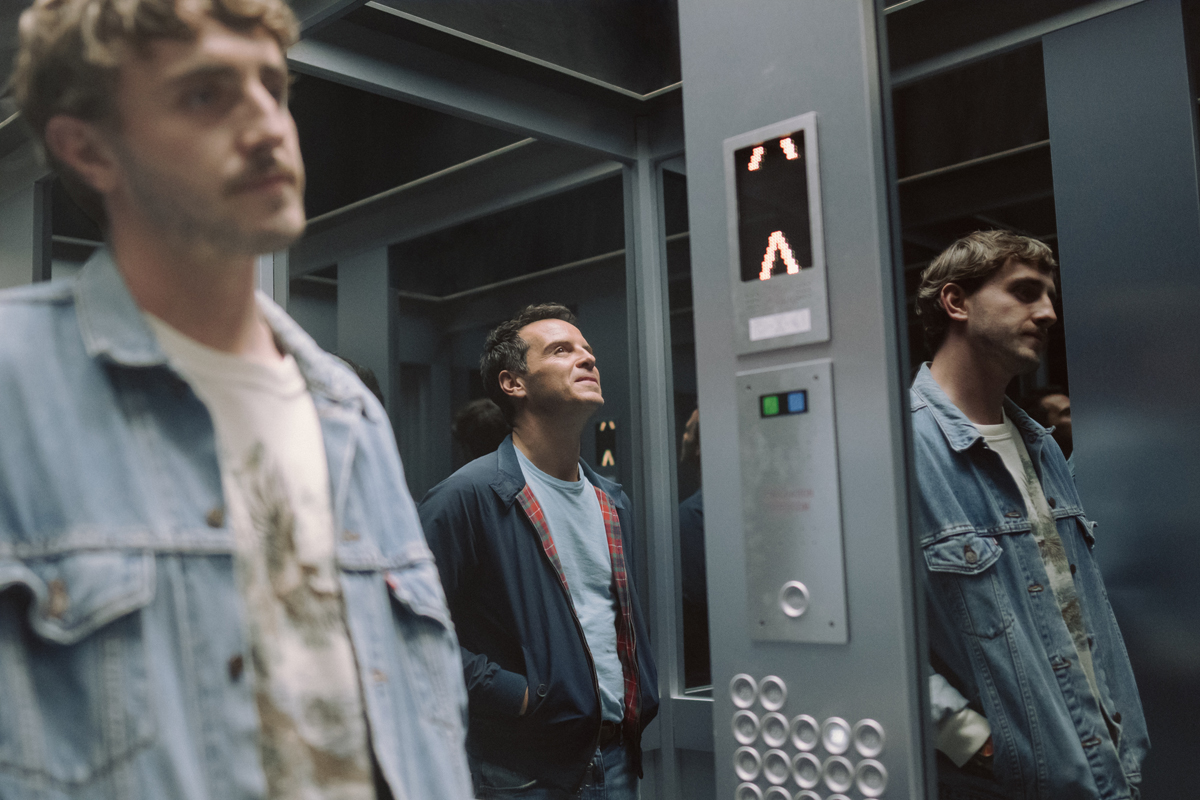
Paul Mescal as Harry and Andrew Scott as Adam in All of Us Strangers. Courtesy Searchlight Pictures. Photo: Chris Harris. © Searchlight Pictures.
These projects have one thing in common: the various dyads and their friends and peers are the sole focus. Family members rarely, if ever, appear, and are often only referred to in conversation. Sometimes Haigh’s characters are shorn of nuclear families altogether. Weekend’s sibling-less Russell, for example, tells Glen that he never knew his birth parents and grew up in a series of foster homes; the spouses of 45 Years are childless. In some respects, Haigh’s latest, All of Us Strangers—very loosely based on Taichi Yamada’s 1987 novel Strangers—recalls Weekend in its emphasis on the heady rush of falling in love felt by Adam (Andrew Scott) and Harry (Paul Mescal), who live in the same apartment tower in London. Yet it marks a significant departure, too, for it not only incorporates the supernatural but also foregrounds Adam’s connection with his parents—a dynamic that introduces the maudlin into Haigh’s work for the first time.
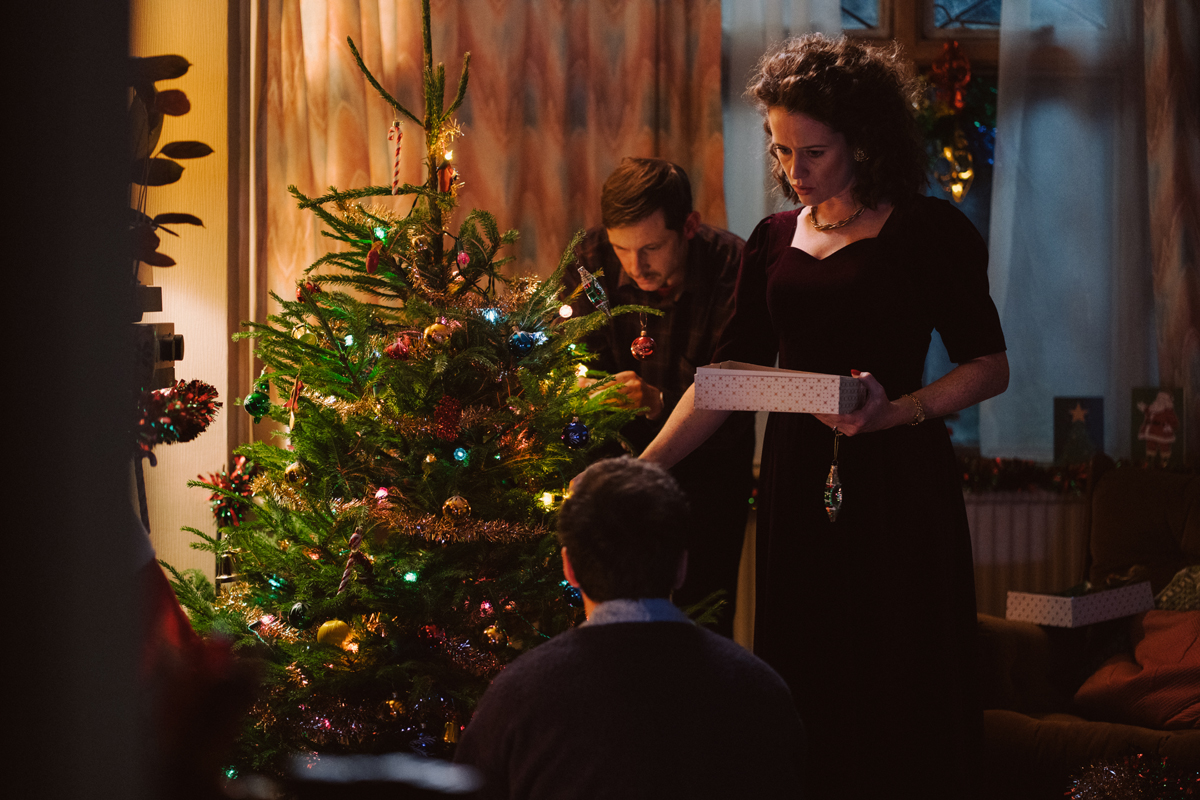
Jamie Bell as Dad and Claire Foy as Mum in All of Us Strangers. Courtesy Searchlight Pictures. Photo: Chris Harris. © Searchlight Pictures.
More specifically, the presence of Adam’s mother (Claire Foy) and father (Jamie Bell) is a manifestation of the paranormal: they have been dead since Christmastime of 1987, killed in a car crash shortly before their son turned twelve. Adam, now a screenwriter in his forties, is currently toiling in fits and starts on a script about the last year his parents were alive; he types as the sounds of ’80s tracks, like Fine Young Cannibals’ ska-rock plea “Johnny Come Home” and the Frankie Goes to Hollywood ballad “The Power of Love,” fill his flat. One afternoon, shortly after his first encounter with twentysomething Harry—who, drunk, comes on to his neighbor, his advances politely rebuffed—Adam takes a commuter train to the sleepy exurb where he grew up and is warmly welcomed into his childhood home by his parents, who are the still the same age they were in ’87.
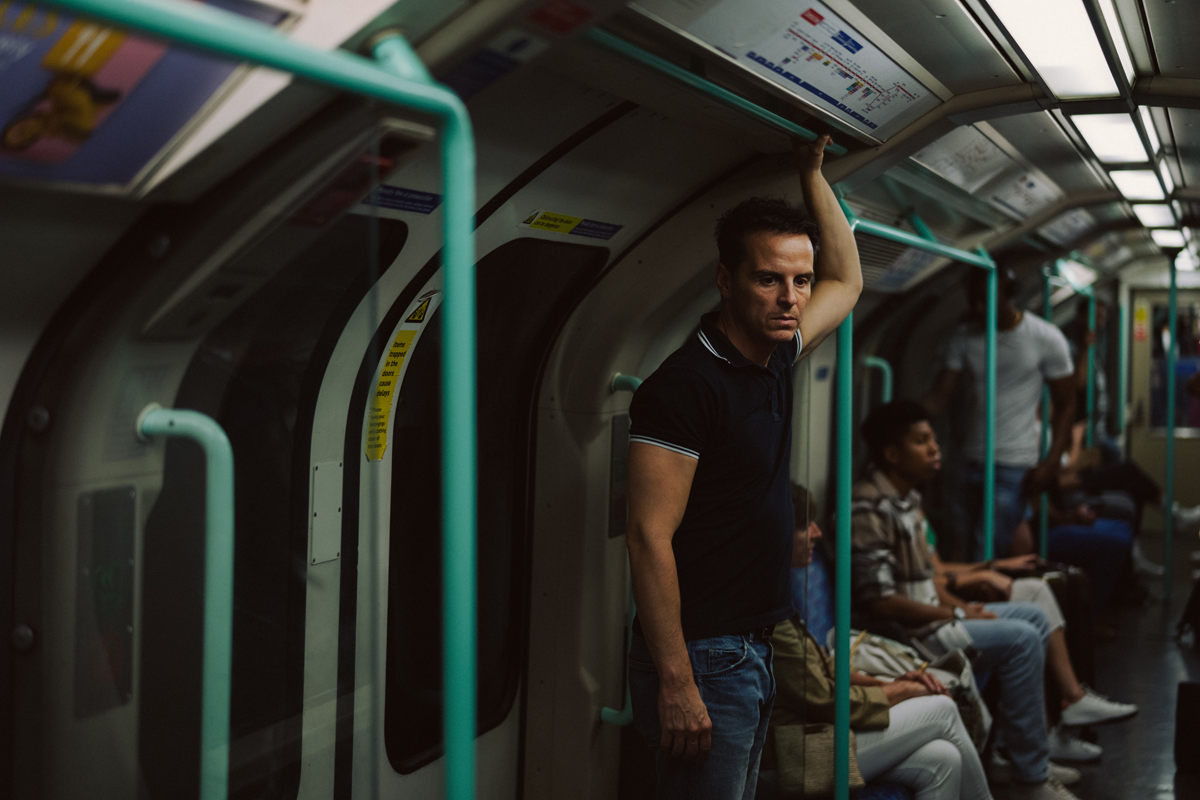
Andrew Scott as Adam in All of Us Strangers. Courtesy Searchlight Pictures. Photo: Chris Harris. © Searchlight Pictures.
Adam will make this fantastic voyage intermittently throughout the film, each visit an occasion for him to tell his mother and father about the changes in his life—and gay life more broadly—over the past thirty-plus years. At times Haigh infuses this otherworldly scenario with welcome risqué humor; before we know that the man eagerly beseeching Adam to follow him into the woods is his father, for example, Bell’s character could be mistaken for somebody cruising the scriptwriter. An odd sexual frisson also arises in a moment with his mother; after she insists that Adam, caught in a rainstorm, take off his wet clothes, she sizes him up in a not entirely maternal way: “You were just a boy. But now you’re not. . . . I thought you’d be hairier, like your dad.”
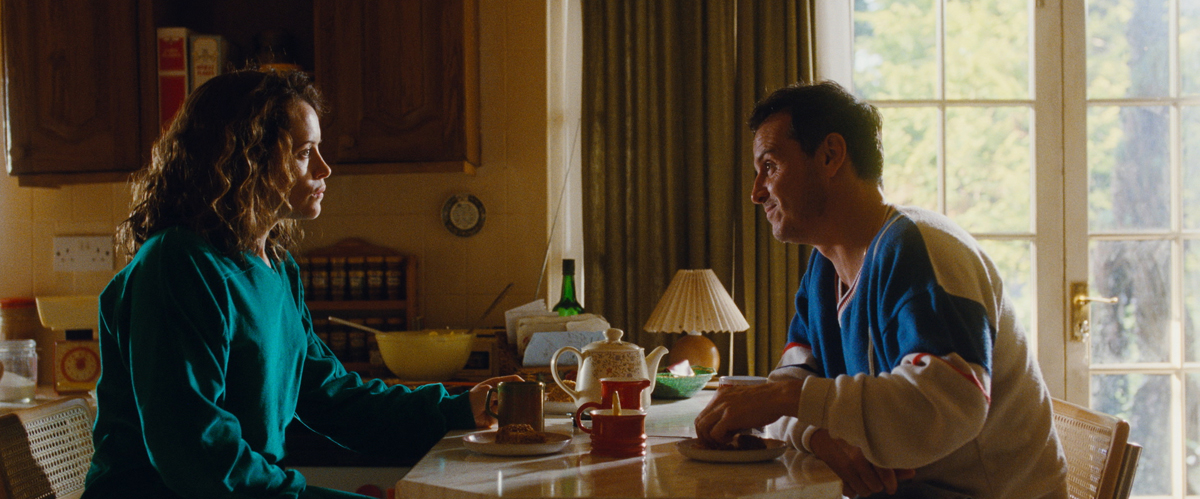
Claire Foy as Mum and Andrew Scott as Adam in All of Us Strangers. Courtesy Searchlight Pictures. © Searchlight Pictures.
Yet Adam’s exchanges with his parents are distinguished primarily by sentimentality and commonplaces. After telling them that he’s gay, his conversations, especially with Mum, repeatedly emphasize the vast chasm separating the miseries of LGBTQ life during the late-Thatcher epoch from today’s love-is-love attitude. “Aren’t people nasty to you?” she frets, her son reassuring her, “Everything’s different now.” There are tears, admissions of wrongdoing. Forgiveness is granted. Adam’s parents tell him how proud they are of him. I sat unmoved by it all.
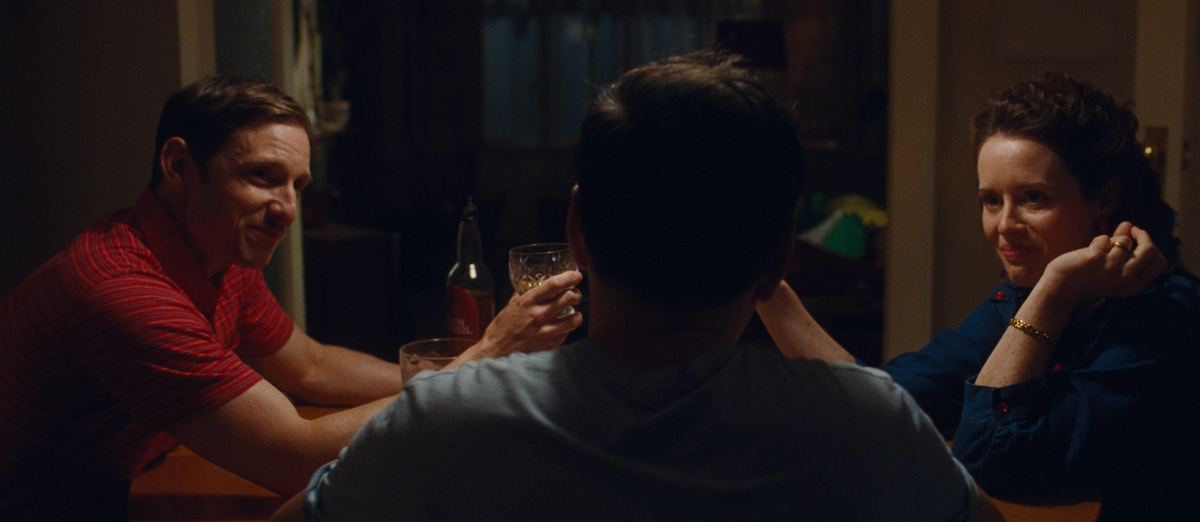
Jamie Bell as Dad and Claire Foy as Mum in All of Us Strangers. Courtesy Searchlight Pictures. © Searchlight Pictures.
Lest this American sapphist—older than Haigh and Adam but of the same generation, with her own still-fresh memories of personal anguish and national homophobic disgrace during the ’80s—stand accused of being ice-hearted, may I say that I found these scenes so trite and disappointing largely because Haigh had already beautifully reimagined the coming-out-to-the-parents scene in Weekend by erasing the parents altogether. In a tender morning-after chat, orphaned Russell tells Glen that he’s always been fascinated by his previous lovers’ coming-out stories, a gay rite of passage denied him. Glen suggests a bit of role-play, taking the part of Russell’s dad. Russell’s act of self-disclosure is all the more touching because it removes the inevitable melodrama when a child, no matter what age, confesses something so profoundly personal to the people (or person) who raised them, who have the power to withhold or grant acceptance.
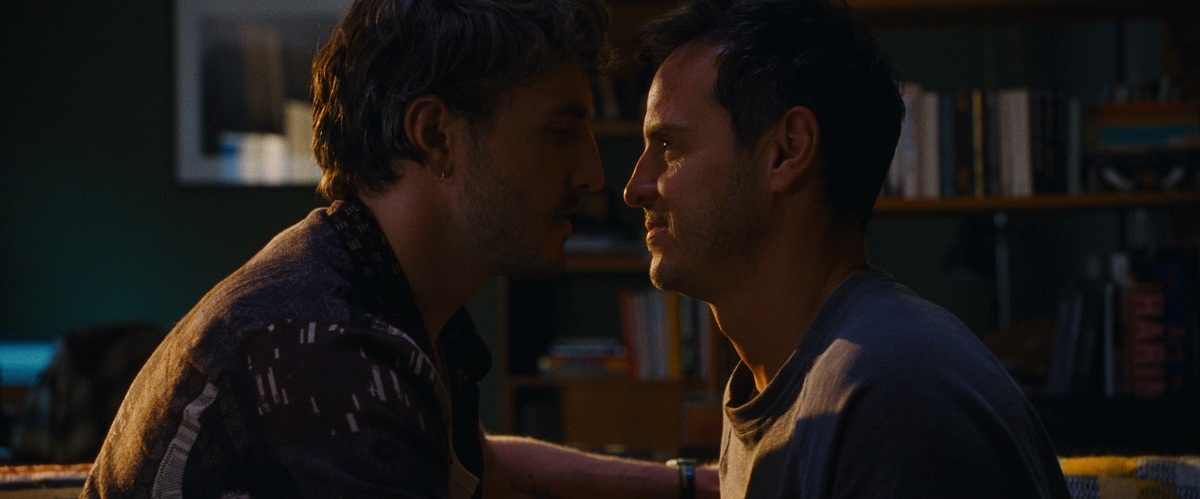
Paul Mescal as Harry and Andrew Scott as Adam in All of Us Strangers. Courtesy Searchlight Pictures. © Searchlight Pictures.
Despite my impatience with the segments devoted to Adam’s metaphysical encounters with his mother and father, much of All of Us Strangers continues the emotional and erotic acuity found in Haigh’s previous work. The deepening relationship between Harry and Adam, like that between Glen and Russell, casts a particular spell, affording viewers long, unrushed episodes of carnal heat and intimate talk. “How ’bout I kiss ya?” hungry Harry asks Adam during their second, more successful meeting. Haigh is the nonpareil filmmaker of the lusty, languorous man-on-man liplock; he is also matchless in depicting more X-rated action, such as the responses of a lover to his partner’s jizz-garlanded torso.
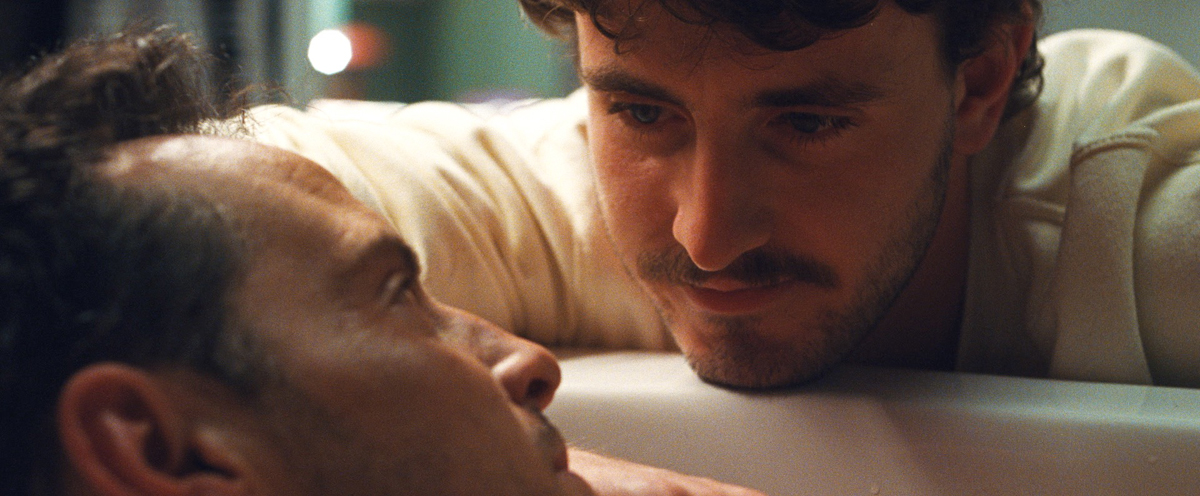
Andrew Scott as Adam and Paul Mescal as Harry in All of Us Strangers. Courtesy Searchlight Pictures. © Searchlight Pictures.
The sexiest scenes between the burgeoning couple, though, feature one listening raptly to the other. Their discussions achieve a certain poignancy owing to the roughly two-decade age gap between them (Harry and Adam may be the first intergenerational couple in Haigh’s oeuvre). Adam, relaxing in a hot bath that Harry has drawn for him, explains that he was terrified of anal penetration for years “for obvious reasons”—reasons that aren’t obvious at all to the younger man, a product of the PrEP era. As Harry describes his relationship to his nuclear kin to Adam, he calmly states that he’s “drifted to the edge” of the family, to whom he’s been out for years, a kind of self-imposed exile that suits him. Free of family’s immurements, Harry, like Haigh’s other protagonists, can live in the present tense, no longer beholden to ghosts.
Melissa Anderson is the film editor of 4Columns and the author of a monograph on David Lynch’s Inland Empire from Fireflies Press.